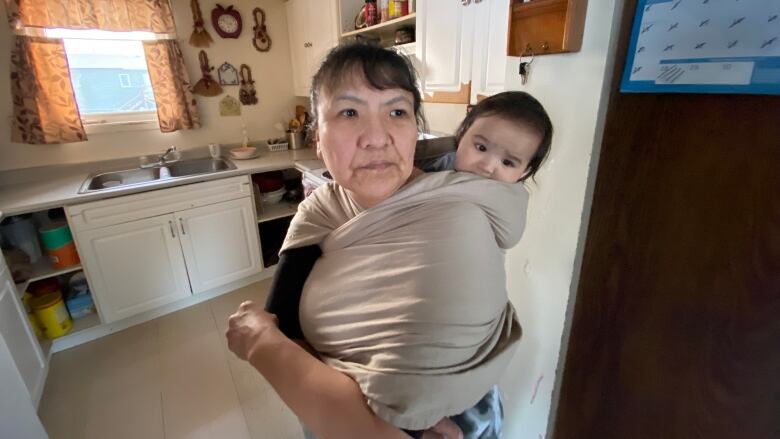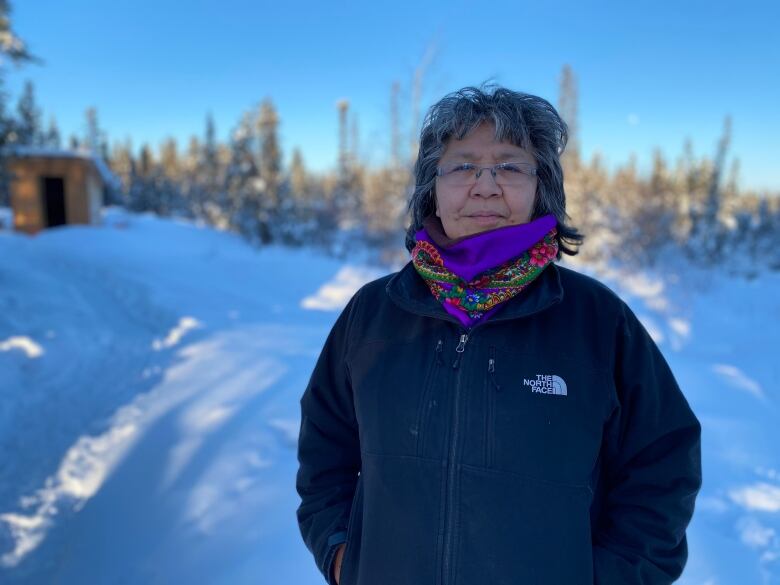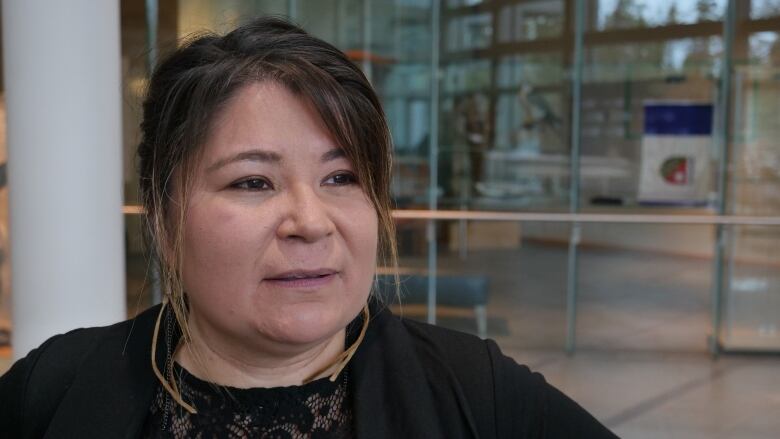Mortgage debt adds to woes for What, N.W.T., woman in an overcrowded house
'I thought it was my house ... and next thing, I look at the bills and I'm facing $141,000'

In addition to the stress of living in a three-bedroom home with 12 people, Jacqueline Williah has another problem a huge mortgage debt she didn't know about until her former husband died.
CBC wrote about Williah's situation last week, as an example of one of many people in the territory living in overcrowded housing. The story behind the ownership of that house is just as distressing as her present situation.
"I thought it was my house," Williah said. "And next thing, I look at the bills and I'm facing $141,000."
Williah was living with her parents before she moved into the little house along the shores of Lac La Marte she now calls home. She remembers the house was originally reserved for an elder in her husband's family, but the elder decided not to live in the home because it was too far from amenities in the community.
Williah and her husband moved into the three-bedroom home in 1994. Shortly after, they started a family that now includes six children and three grandchildren, all of whom still live there.

The couple split up in 2010, after which she remained in the house with her children.
But it wasn't until her former husband died in 2021 that she got a surprising letter from Housing NWT.
"Dear Jacqueline, I am very sorry to hear of Fred's passing," the letter begins. "I send my sincerest sympathies to you and your family. I hope you are doing well.
"I am writing to provide an updated mortgage balance and offer you a payment plan. Your current balance as of October 31, 2021 is $141,209.50. Since signing a mortgage agreement, we never did receive a payment, so the balance owing is quite high."
Williah was shocked to find out she didn't own her house that she lived in for close to three decades.
"I never signed any papers," she told CBC.
Williah has not seen the original mortgage document.
It was her understanding any paperwork signed in 1994 was transferring ownership of the house to the family.
Lack of translators
Williah's story is one of several across the territory when it comes to the miscommunication and confusion surrounding mortgage documents signed in the '80s and '90s.
Monfwi MLA Jane Weyallon Armstrong said she's heard similar stories from other residents in the Tch region, who have experienced similar miscommunication

"A lot of people are telling me, saying they didn't know they had a mortgage because they never received any documents or invoices or anything like that," Weyallon Armstrong told the CBC.
At the time, English comprehension in the communities was low, and there was a lack of interpreters in the communities, Armstrong said.
"There was not enough trained interpreters at the time, so they just got anybody off the street," she said. "I think it's wrong how this whole thing happened."
Majority of mortgages in arrears
Currently, Housing NWT has 247 mortgage client files in the territory, with 207 in arrears 83 per cent.
It's a longstanding problem. In 2008, the Auditor General of Canada released a report criticizing the territorial government for not evaluating its home ownership programs regularly. At that time, 81 per cent of mortgages through the housing corporation were in arrears.
One contributing factor was the lack of communication after the contracts were signed.
While documents were signed in the '80s and '90s, most communities did not have a local housing authority office, which led to a lack of followup for some, that situation lasted for decades.
Armstrong brought the issue up in the Legislative Assembly last October asking Paulie Chinna, the housing minister, to forgive mortgage arrears "of constituents who did not understand anything about mortgages and were not informed in their own language."
During the assembly, Chinna said she would "look at writing off debts," but did not commit.
'I would like to close up those files'
In an interview with CBC, Chinna said the territorial government is committed to working with its mortgage clients.
"We do have a number of mortgage clients throughout the Northwest Territories that I would like to close up those files. I would like to come up with fair adequate solutions in making those files and the clients become official homeowners," Chinna said.

Chinna acknowledged not all of the documents were translated properly and said the department is working towardimprovements.
"I recognized language barriers, being an Indigenous woman coming from a smaller community, and also recognizing that all of those documents were not properly communicated and the administration of them as well," Chinna said.
Currently, dozens of policies with Housing NWT are under review, Chinna said, and the territorial government is working with Indigenous governments across the territory to address the housing crisis.
"I do want to see people successful and I do want them to become homeowners and housing to be more of an opportunity and not a barrier."
Payment plans offered to long-term residents
Housing NWT offered a refinance option to Williah with three different payment plans one for 15 years, 20 years and 25 years, according to the letter she received from Housing NWT.
Williah has already lived in her home for about 29 years.
At 51-years-old, Williah only works part-time now and says she doesn't know how she would afford a mortgage.
"How can I pay a mortgage? You know, here there are expenses and food and I have to feed my kids only by myself."












_(720p).jpg)


 OFFICIAL HD MUSIC VIDEO.jpg)
.jpg)



























































































